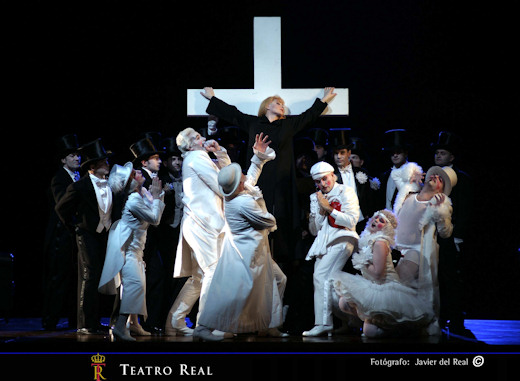Other Links
Editorial Board
- Editor - Bill Kenny
Assistant Webmaster -Stan Metzger - Founder - Len Mullenger
Google Site Search
SEEN AND HEARD
INTERNATIONAL OPERA REVIEW Korngold, Die Tote Stadt:
Soloists, Orquesta Sinfónica de Madrid. Coro de la Comunidad de Madrid, Conductor: Pinchas Steinberg. Teatro Real de Madrid. 14
and 15.6.2010 (JMI) Production Vienna Staatsoper and Salzbourg Festival. Direction: Willy Decker (Original) Karin Voykowitsch
(Revival) Sets and Costumes: Wolfgang Gussmann. Lighting: Wolfgang Göbbel. Paul: Klaus Florian Vogt/Burkhard Fritz. Marie/Marietta: Manuela Uhl/Solveig Kringelborn. Frank/Fritz: Lucas Meachem. Brigitta: Nadine Weissmann. Juliette: Susana Cordón. Lucienne: Anna Tobella. Victorin/Gaston voice: Roger Padullés. Count Albert: Eduardo Santamaría.
Finally Korngold's masterpiece comes to Madrid 90 years after its premiere, although only hardly 4 years after its premiere in Spain at Barcelona’s Liceu. It is definitely better late than
never and was as excellent choice by Antonio Moral for his farewell as Artistic Director of
the Teatro Real. Both performances attracted a full house and there was
great enthusiasm for Pinchas Steinberg and the orchestra. Klaus Florian Vogt and Manuela Uhl were also cheered, although there was
one isolated burst of booing to Mr. Vogt. Despite the fact of this being the premiere, the creative team did not take their bow.
Cast:

Production Picture © Javier del Real
Teatro Real had decided to offer this opera with the best conditions possible and began with an excellent production, which was premiered at the Vienna Staatsoper to continue later
en route (August 2004) to the Salzburg Festival. In recent years Willy Decker's production has been seen and enjoyed in
many great opera houses such as London's Covent Garden, the Paris Bastille or the War Memorial
Hall in San Francisco. Now it comes to Madrid, where once again it had a splendid reception. The argument of this opera is well known to the public, since it is the same subject –
mutatis mutandi - which inspired Alfred Hitchcock for his famous film
Vertigo, with the unforgettable James Stewart and Kim Novak. The mixture of reality and memories, nightmares and obsessions, makes it an ingenious work
in itself but the magnificent Korngold music completes an opera which stands
at the height of the best in history.
Willy Decker has done excellent work in this case, starting with its musical depth. I have rarely attended a performance, where every detail of the score has a perfect reflection with what is happening on stage. When Korngold wishes to highlight something, Willy Decker is at his service.
This is a real lesson to stage directors obsessed with new readings, whose only objective is to offer their own opera, when not
trying to outrage the audience. This production narrates the plot
faithfully with this mixture of reality and fiction and leaves the audience to draw conclusions. The dream scenes, which abound in this opera, are very well resolved dramatically by Willy Decker and his team: the procession in Bruges, the novices' parade with a crucified Brigitta, the murder of Marietta, which is
just a new hallucination of the protagonist, surely recalling his other previous crime, Marie’s
murder. In sum, this is an outstanding production.
The veteran Israeli conductor Pinchas Steinberg returned to Teatro Real after five years of absence and we all missed him after his magnificent
Frau Ohne Schatten. Mr. Steinberg musical direction was has magnificent, inspired and spectacular. He has a special affinity with the music of Korngold and he is able to transmit it to the orchestra. Few times, if ever,
have we heard such a performance from this orchestra as in this case. Let us hope that he might come back soon again.
The decision is in Gerard Mortier's hands.
Paul is one of the most demanding roles written for a tenor. He is on stage from the first bar until the
opera's ending and if we add to this a rather high tessitura and the need to
sing against a huge orchestra, we rightly conclude that very few singers can sing the part. Klaus Florian Vogt is possibly the best of all of them, as already shown previously in Vienna and Barcelona. His stage performance was excellent and he was also a
marvellous singer. Recognizing the quality of his interpretation, I found him less bright than in previous occasions and more insecure in the high notes. He started with
a certain caution, singing the lute’s duet very well, but gaining in confidence and conveying emotion and conviction
as he went on. Despite his undoubted talent, in the first part he offered some too tight high notes at one point, while he almost cracked in the
final act.
In the second cast Paul was another German tenor Burkhard Fritz, whose performance
was also convincing. As an interpreter he is not at the same level than Vogt
but vocally, his instrument is more dramatic than his colleague’s, offering more security at the top notes. All in all, a remarkable interpretation.
The German soprano Manela Uhl was a surprising exponent of Marie and Marietta, offering a very convincing stage and vocal interpretation. She also had to fight with the score, which is extremely demanding,
but she coped with all of it. Solveig Kringelborn in the second cast was convincing on stage
too, but clearly insufficient in vocal terms. When the score does not call for forte, her middle range is too small to
carry over the orchestra. When singing forte, which is quite common in this opera, she offers
a good deal of instability with a too wide a vibrato for a singer of her age.
The American baritone Lucas Meachem was an acceptable performer for Frank and Fritz. He is a lyric baritone with a pleasant timbre, but
he failed to thrill in the Pierrot song, one of the jewels that Korngold offers
a great baritone, so that he can succeed through pure emotional impact. Nadine Weissmann was a very appropriate Brigitta,
except for a rather unpleasant top register.
José M Irurzun
